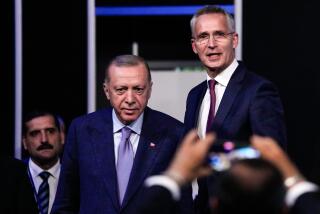Turkey Moves to Relax Kurdish Language Rules
ANKARA, Turkey — In a move heralded by many as a milestone for Turkey’s struggling democracy, parliament approved several groundbreaking constitutional reforms Wednesday, including measures easing restrictions on broadcasting and publishing in the Kurdish language.
“This is a healthy first step, if not a final one, toward satisfying the Kurdish demands for greater cultural freedoms,” said Dengir Mir Firat, an ethnic Kurdish opposition lawmaker from the Islamic-leaning Justice and Development Party.
The 550-member legislature has been working almost nonstop since Monday to push through a package of 37 reforms designed to bring Turkey closer to its long-cherished goal of European Union membership.
The country was accepted as a candidate for EU membership in 1999, but it was told then that it needed to improve minority and human rights before it could start accession talks.
Under the Turkish Constitution, any amendment must be approved individually--twice--by at least three-fifths of parliament. After that, the entire reform package will still need to be approved by a majority of the chamber. But with 343 seats under its command, and barring last-minute defections, the ruling coalition is widely expected to push the measures through.
Debate on the reforms comes as the EU is preparing its annual progress report on Turkey’s candidacy. The report is to be released in November, EU sources said.
The issue of Kurdish language rights is highly sensitive in a nation racked by more than 15 years of separatist conflict in the ethnic Kurdish-dominated southeast. The fighting has claimed more than 30,000 lives since 1984.
Successive Turkish governments have resisted lifting curbs on the Kurdish language, fearing that such moves would fan separatism among the country’s estimated 12 million Kurds. Proposals to legalize Kurdish-language education are noticeably absent from the reform package.
Earlier, lawmakers approved an amendment reducing the maximum period that suspects can be held without being charged from seven days to four. Human rights groups say it is mostly during pretrial custody periods that detainees are tortured. They also voted to severely limit the circumstances under which state officials can tap phones and conduct searches without a warrant.
“Parliament is on the way [to] going down in history as the pioneers of Turkey’s reformation process,” wrote Ilnur Cevik, editor of the liberal, English-language Turkish Daily News. “The performance of the parliament is going beyond even our wildest dreams.”
Turkey’s Constitution was drawn up in 1982 by the country’s generals, who last seized power in a coup in 1980. A proposed amendment that would have paved the way for prosecuting coup leaders was dropped, reportedly after stiff opposition from the top brass.
Parliament also stopped short of abolishing the death penalty--another condition set by the EU for membership. Instead, lawmakers agreed to end that punishment for ordinary criminals but not for those accused of terror crimes.
The provision was designed to exclude Abdullah Ocalan, the Kurdish rebel chief sentenced to hang for treason. Turkish special forces caught him in early 1999 in Kenya.
Turkey has not carried out any executions since 1984, and Ocalan’s was stayed after he called off his rebellion and ordered his forces to withdraw to Kurdish-controlled northern Iraq.
More to Read
Sign up for Essential California
The most important California stories and recommendations in your inbox every morning.
You may occasionally receive promotional content from the Los Angeles Times.










